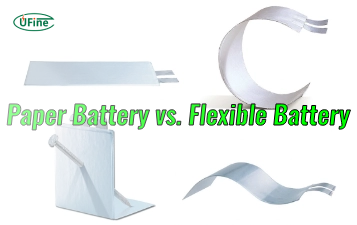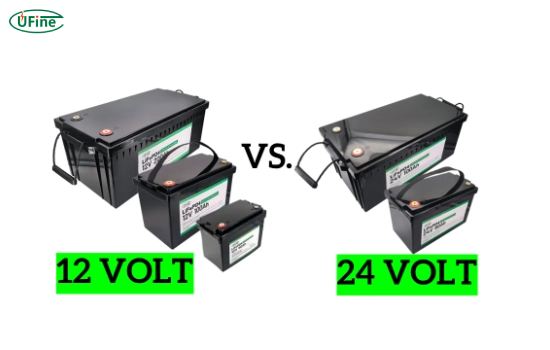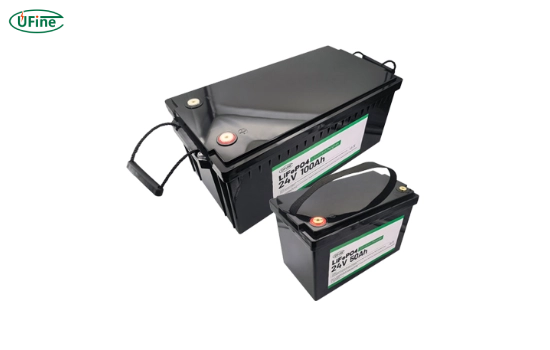The demand for efficient and reliable energy storage solutions has surged in recent years, particularly with the rise of renewable energy sources and electric vehicles. Among the various battery technologies available, the 24V LiFePO4 battery (Lithium Iron Phosphate) has emerged as a popular choice due to its numerous advantages. This guide will delve into the intricacies of 24V LiFePO4 batteries, exploring their features, benefits, applications, and much more.
Part 1. What is a 24V LiFePO4 battery?
A 24V LiFePO4 battery is a lithium-ion battery that utilizes lithium iron phosphate as the cathode material. This battery configuration operates at a nominal voltage of 24 volts, making it suitable for various applications, particularly in renewable energy systems and electric vehicles.
Key Features of 24V LiFePO4 Batteries
- Long Cycle Life: LiFePO4 batteries can last over 2000 cycles, significantly outlasting traditional lead-acid batteries.
- High Thermal Stability: These batteries are less prone to overheating, reducing the risk of thermal runaway.
- Fast Charging: 24V LiFePO4 batteries can be charged rapidly, making them ideal for applications requiring quick turnaround times.
- Lightweight: Compared to lead-acid batteries, LiFePO4 batteries are much lighter, enhancing portability and ease of installation.
Part 2. Why choose a 24V battery system?
24V vs. 12V Battery Systems
- Voltage Differences: A 24V system runs at a higher voltage than a 12V system, which allows it to deliver the same power with half the current. This means you can use thinner wires, reducing both weight and cost. For example, to power a 100-watt device, a 12V system would need about 8.33 amps, but a 24V system would only need 4.17 amps. Less current means less energy lost in the wires, making the system more efficient.
- Benefits of 24V Systems: A 24V system is more effective in high-power applications like electric vehicles, solar systems, and industrial machines. A lower current reduces the chance of overheating and allows longer wires without a significant voltage drop.
| Feature | 24V Battery System | 12V Battery System |
|---|---|---|
| Voltage | Higher voltage for greater efficiency | Lower voltage, less efficient for high loads |
| Current Draw | Lower current for the same power output | Higher current, which can lead to more heat loss |
| Size and Weight | More compact for higher power applications | Larger and heavier for equivalent power |
Efficiency and Power Delivery
The higher voltage of a 24V system allows for more efficient operation of inverters and motors. Since these devices often perform better at higher voltages, a 24V system can improve performance and lower energy costs. Solar charge controllers and DC-DC converters are generally more efficient in a 24V configuration, further enhancing system performance. This means less energy is lost as heat, making it an optimal choice for high-power applications.
Part 3. Advantages of using 24V LiFePO4 batteries
- Safety: LiFePO4 batteries are known for their safety features, including a stable chemistry that minimizes the risk of fire or explosion.
- Environmental Impact: They are more environmentally friendly than lead-acid batteries, as they do not contain toxic heavy metals.
- Versatility: These batteries can be used in various applications, from home energy storage to electric vehicles.
- Cost-Effectiveness: Although the initial cost may be higher, the long-term savings from reduced maintenance and replacement costs make them a financially sound investment.
Part 4. Applications of 24V LiFePO4 batteries
1. Renewable Energy Storage
24V LiFePO4 batteries are widely used in solar energy systems to store excess energy generated during the day for use at night or during cloudy days.
2. Electric Vehicles and Mobility Solutions
These batteries are a popular choice for electric vehicles (EVs) due to their lightweight, high energy density, and long cycle life, providing efficient power for longer distances.
3. Marine and RV Applications
In marine and recreational vehicle (RV) settings, 24V LiFePO4 batteries offer reliable power for appliances and systems while saving weight and space.
4. Industrial and Commercial Use
Businesses utilize 24V LiFePO4 batteries in backup power systems, material handling equipment, and other industrial applications where reliable energy storage is crucial.
Part 5. How to choose the right 24V LiFePO4 battery?
When selecting a 24V LiFePO4 battery, consider the following factors:
- Capacity: Determine the required capacity based on your energy needs.
- Discharge Rate: Ensure the battery can handle the maximum discharge rate necessary for your application.
- Brand Reputation: Choose reputable manufacturers known for quality and reliability.
- Warranty: Look for batteries that come with a solid warranty to protect your investment.
Part 6. Installation and maintenance of 24V LiFePO4 batteries
1. Installation Guidelines
- Location: Install the battery in a cool, dry place away from direct sunlight.
- Connections: Ensure all connections are secure and follow the manufacturer’s wiring guidelines.
2. Regular Maintenance Tips
- Check Voltage: Regularly monitor the battery voltage to ensure it remains within the optimal range.
- Clean Terminals: Keep the battery terminals clean and free from corrosion.
3. Troubleshooting Common Issues
- Battery Not Charging: Check the charger and connections for any faults.
- Low Capacity: If the battery discharges too quickly, it may be nearing the end of its life.
Part 7. Safety considerations for 24V LiFePO4 batteries
1. Inherent Safety Features
LiFePO4 batteries are designed with safety in mind, featuring built-in protection against overcharging, overheating, and short circuits.
2. Safe Handling and Storage Practices
- Avoid Extreme Temperatures: Store batteries in a temperature-controlled environment to prevent damage.
- Use Proper Equipment: Use compatible chargers and connectors to avoid electrical hazards.
3. Compliance with Industry Standards
Ensure your batteries comply with safety and performance standards, such as UL or CE certifications.
Part 8. Comparing 24V LiFePO4 batteries with other battery types
When selecting a battery system, it’s essential to understand how 24V LiFePO4 batteries compare to other common battery types, such as lead-acid and lithium-ion batteries. Each battery type has unique characteristics, advantages, and drawbacks, which can significantly influence your choice based on specific needs.
24V LiFePO4 Batteries are known for their safety, longevity, and efficiency. They offer a longer lifespan and higher energy density than traditional lead-acid batteries, making them a more reliable choice for various applications. However, they may come at a higher initial cost.
While cheaper upfront, lead-acid batteries have a shorter lifespan and lower efficiency. They also require more maintenance and are heavier, making them less suitable for applications where weight is a concern.
Other lithium-ion batteries offer advantages similar to those of LiFePO4 batteries. Still, they may have different thermal stability and safety features. They often come with higher energy densities but can be more prone to overheating.
Here’s a comparison table summarizing these differences:
| Feature | 24V LiFePO4 Battery | Lead-Acid Battery | Other Lithium-Ion Batteries |
|---|---|---|---|
| Cycle Life | 2000+ cycles | 500-1000 cycles | 1000-2000 cycles |
| Weight | Lightweight | Heavier | Varies, generally lighter |
| Safety | High | Moderate risk of leakage | Varies, generally safer |
| Cost | Higher upfront, lower lifetime cost | Lower upfront, higher lifetime cost | Varies |
Part 9. FAQs
-
What is the lifespan of a 24V LiFePO4 battery?
The lifespan of a 24V LiFePO4 battery can exceed 2000 cycles, depending on usage and maintenance. -
Can I use a 24V LiFePO4 battery for solar energy storage?
Yes, 24V LiFePO4 batteries are ideal for solar energy storage, allowing you to store excess energy generated by solar panels. -
Are 24V LiFePO4 batteries safe?
They are safe due to their stable chemistry and built-in protection against overcharging and overheating. -
How do I maintain my 24V LiFePO4 battery?
Regularly check the voltage, clean the terminals, and ensure proper charging practices to maintain your battery. -
What are the advantages of using LiFePO4 over lead-acid batteries?
LiFePO4 batteries offer longer cycle life, better thermal stability, and are lighter, making them more efficient for various applications.
Related Tags:
More Articles

Paper Battery vs. Flexible Battery: What’s the Difference and Which Is Better?
Paper vs. flexible batteries: learn the key differences, benefits, and which power source fits best for wearables, sensors, and smart tech.
What to Know Before Buying a Tiny LiPo Battery for Your Project
Tiny LiPo batteries are powerful and compact. Learn how to choose the right one for your project with specs, safety, and charging tips.
Bloated LiPo Battery: Will It Explode?
Will a bloated LiPo battery explode? Discover the causes, risks, safety steps, and expert tips to avoid disaster and protect your gear. Must-read safety guide!
12V 100Ah Lithium Ion Battery Price: Full Guide
Learn about 12V 100Ah lithium-ion battery price, from cost ranges to best brands, hidden fees, and how to get the best deal. A must-read for smart buyers!
Resistance and Conductivity: What It Means for Your Lithium Batteries
Resistance and conductivity impact lithium battery performance, lifespan, and safety—learn how they work and why they matter.





